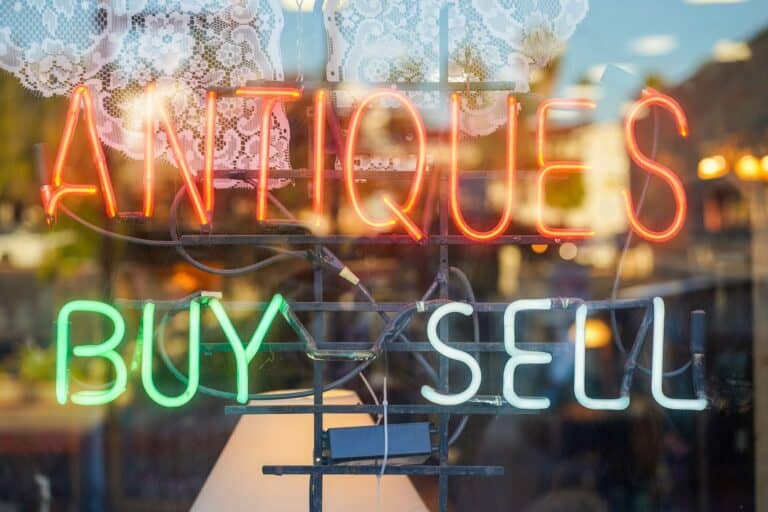If you want to make money selling antiques, there are no four ways to go. Either you embrace the career of antique dealer or auctioneer, in which case you will have to follow a university course in art history in general and then a training course (count several years). Or you can turn it into a hobby that will provide you with a financial complement, which can be significant if you know where to find antiques at a good price.
Can I make money selling antiques as a hobby?
There are anecdotes too numerous to be counted, where simple amateurs of antique objects ended up becoming famous antique dealers. And this without any particular academic training, only by force of will and a passion for antiques. But these people are still the exception. And if you want to make antiques your profession, you should know that the median salary of an antique dealer is around $50,000 per year.
We won’t go into detail here about the process of becoming a professional antique dealer. This is not the purpose of this article, which is rather addressed to all those who wish to make it a hobby offering an additional source of income. Again, if you know what to buy and at what price, and where to sell it, you can very well make this hobby your permanent activity and quit your 9-to-5 job. It takes discipline, knowledge, determination, and a certain amount of luck.
If you are interested in becoming a professional antique dealer, we invite you to read our article “How To Become A Successful Antique Dealer”.
Getting started in the antique business with the antiques you already own
A good way to start making money selling antiques is to start with the antiques you already own. For example, the one you inherited. You can start your journey, by doing online research on the internet, before having your antiques appraised if necessary. From there, the process of finding potential buyers can begin.
Once your artwork or family heirloom has been appraised, you can choose to keep it or sell it. If you decide to sell it, you should know there are four main channels that can be considered for selling antiques. Each of these channels has a different system of fees and rates. Your choice should be made according to the type of antiques you want to sell, the profit you expect to make, and the time you have at your disposal.
Whichever channel you choose, keep in mind that it is usually tricky to estimate antiques correctly and that there is a general tendency to overestimate what we own.
Selling antiques directly to a merchant
First case scenario: selling an antique to a merchant. You should show the object to an antique dealer with whom you are acquainted and have a good relationship.
The antique merchant or second-hand dealer who has a well-established brick-and-mortar store or who sells at antique fairs or on the Internet will buy the object at a lower price than the price at which he intends to resell it. The advantage is that he will get the object right away and will want to sell it quickly to avoid storage costs. A successful merchant who knows his trade either already has a potential customer for an item he intends to purchase or knows that he will be able to resell it relatively quickly.
Selling antiques at an auction
If you wish to sell your antiques at an auction, it is advisable to get in touch with your nearest auctioneer and tell him the history of the artwork you own. If you have several items to sell, make an appointment with him at your place. The auctioneer will take care of everything and will be responsible for scheduling the date of the sale. But there is no guarantee that he will sell your object. On the other hand, the hammer price can go up. Also, keep in mind that additional fees are added to the final auction price.
The sale of antiques involves highly variable fees depending on the channel used (in %):
- Auction sale fees: 10% to 15% of the auction price including VAT
- Online antique websites: 15% to 25% of the sale amount
- Antique dealers: 30% to 40% of the estimate (margin)
- Consignment shop: 30% to 45% of the sale price
Selling antiques via a consignment shop
Consignment shops are the third possible channel to sell antiques. However, it is more suited to second-hand goods. Consignment sale basically puts buyers and sellers in contact with each other in a store. Some consignment shops buy the item in cash, so you receive the money right away.
If this is not the case, the transaction only takes place when the item is sold: before that, you remain the owner of the goods. Two of the major drawbacks of this method of sale are that you are not guaranteed to be able to sell your item. And the price obtained is often lower than in other channels because the prices charged in these businesses are particularly low and the items are not often old.
Selling antiques on the Internet
Finally, online shops for antiques & vintage products are one of the fastest-growing channels to sell antiques, as the number of players is constantly on the rise. It is indeed possible to quickly and easily sell antiques without leaving the comfort of your own home, through one of many online shops for vintage and antiques, which are aimed at a worldwide community of buyers.
Two types of online platforms to sell antiques currently coexist. There are those that allow direct sales between two individuals, and those that sell antiques on your behalf. If you choose an online platform with a trusted third party who takes care of everything like Ruby Lane, 1stDibs, Etsy, or Selency to name a few, you should know that the fees are proportional to the services offered. If you choose a website with classified ads, you will be in direct contact with the buyer. In that case, the costs will be lower but the time needed to find a buyer might be longer.
Regardless of the chosen online channel, you want to go with, it is important to think about the price you want to sell your item for, which should usually be a little below the market average for the same type of item. Also make sure to take high-quality photographs of your antique items to sell online, in order to make your ad stand out from the rest.
One last thing to take into consideration: while selling antiques online is usually a quick process, it is yet not as simple as upload and go. Understanding marketplace policies and learning tricks of the internet trade can be overwhelming. Savvy sellers do their homework, like for instance by following these 9 tips on how to sell antiques online.
Photo by Samuel Ramos on Unsplash



